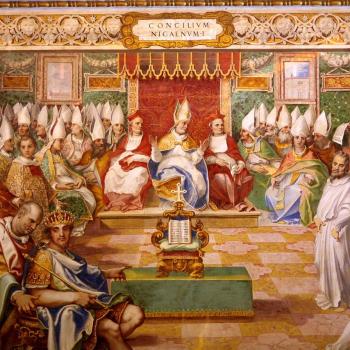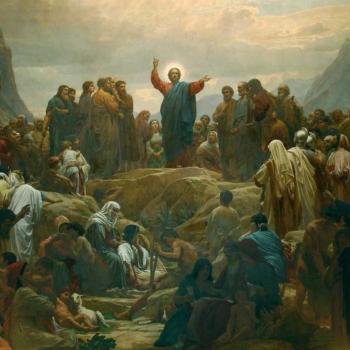 Dr. Bruce Ashford, who serves as Provost, Dean of the Faculty, and Professor of Theology & Culture at Southeastern Baptist Theological Seminary, drops by today to chat about his new book and how Christians should engage the culture.
Dr. Bruce Ashford, who serves as Provost, Dean of the Faculty, and Professor of Theology & Culture at Southeastern Baptist Theological Seminary, drops by today to chat about his new book and how Christians should engage the culture.
In his punchy little book, Every Square Inch, Ashford sets out “to equip Christians to think holistically about how the gospel informs everything we do in the world” (6). The greatest praise I can give to this book is that it’s not a Moral Majority, right-wing, detached-from-culture attempt at cultural engagement. No Jesus Jukes, either. Simply put, Ashford displays a ferocious appetite for gospel-driven cultural engagement. This is a book you should buy not only for yourself, but for your family, friends, staff, and church family.
—
Brandon: What is the big point you are trying to make in Every Square Inch?
Bruce: The big point is that grace renews nature. Or, more plainly, put: when God graciously saves a person and teaches them to trust his word, that salvation and that fidelity to Scripture should shape the way a person makes culture and engages culture.
While this point might seem obvious to some readers, it is a highly contested point. Seculars, of course, tend to want Christians to keep their Christianity restricted to the privacy of their own homes and churches. But even among Christians, many would disagree with my point. Some Anabaptists and monastics view grace in opposition to the natural realm, which means that they tend to withdraw from culture. Alternately, some Thomists view grace as separate from, and hierarchically related to, nature; they tend to keep faith and Scripture separate from their cultural activities because they believe cultural activities can be attended to quite well by drawing upon reason, natural law, and so forth. But I’m arguing that God’s gracious salvation and revelation should be brought to bear upon our culture-making and our cultural engagement.
This book helps Christians avoid cultural anorexia, a situation in which Christians seek to withdraw from the surrounding culture, and cultural gluttony, a situation in which Christians imbibe their cultural surroundings uncritically. It helps all Christians shape their social and cultural activities toward Christ, so that they not only proclaim him with their lips but truly and faithfully promote him with their (cultural) lives.
Brandon: That’s the theoretical answer, now what are some practical handles for employing the “grace renews nature” paradigm in our cultural activities?
Bruce: OK, let’s make it practical. The books aims to be practical and, in fact, devotes the majority of its pages to showing how a Christian can allow his or her faith to affect interactions in the arts, the sciences, politics, economics, education, and other spheres of culture.
In any sphere of culture, there are three basic questions that a person should ask when making culture, enjoying culture, criticizing culture, or otherwise engaging it.
- The first question is, “What is God’s creational design for a particular sphere of culture?” God created the world and ordered it by means of his word. He still sustains it by means of his word, and we want to ask how this dimension should conform to his word. How should it glorify him? How should it contribute to the common good? And so forth.
- The second question is, “How has this sphere of culture been corrupted and misdirected by sin and idolatry?” At the core of a person is the heart, and a person’s heart beliefs radiate outward into all he does. So if a person’s heart is oriented toward a particular idol, that idol will warp and distort his cultural activity. The same with society. When society is under the sway of idols, that society’s culture as a whole will be warped and distorted by those idols.
- The third question is, “What can I do to bring healing and redirection to this sphere of culture?” Although most of us cannot do anything grandiose to heal or redirect culture, we can do what we can do. We can make sure that our cultural doings are directed toward Christ, done for his glory and for the good of our fellow man.
Brandon: Doesn’t this approach make you a social gospeler?
Bruce: I know the suspense is nearly unbearable… but the answer is “no.” It makes me a gospeler, but not a social gospeler. What is the gospel? The gospel is the announcement that God’s kingdom arrived in the life, death, and resurrection of Jesus, who is King and Savior, in fulfillment of Old Testament prophecy. The gospel calls for belief, trust, and repentance; those who heed this call will find forgiveness of sins and union with Christ, and will live with him eternally on the new heavens and earth.
As for the soteriology operative in the gospel, God’s salvation extends to humanity, but also beyond humanity to the entire cosmos. Why does this matter for a discussion of cultural engagement? First, because when God saves a human being, he saves that person to glorify him in every aspect of that person’s being, including the cultural aspects. Second, because when God saves the cosmos, liberating it from its bondage, it will be replete with culture—with art, architecture, language, song, and so forth.
So, no, I am not a social gospeler. A social gospeler is somebody who emphasizes social and cultural concerns while rejecting or at least de-emphasizing Christ’s substitutionary atonement and its penal aspects. In my view of things, however, substitutionary atonement remains at the burning center of the Christian mission and radiates outward into our social and cultural activities.
Brandon: You argue in the book that cultural engagement is not merely political. Can you explain that more fully?
Bruce: Yes. Many Christians hear “cultural engagement,” and immediately think “political activism.” That is a mistake, and a bad one. Cultural engagement is a broad phenomenon, encompassing many spheres (art, science, politics, business, education, home), many callings (church, family, workplace, community), and many activities (coffee shop conversations, town hall debates, PTA meetings).
And yet, the political sphere is important. How could Christianity possibly be separate from politics? Christianity is a deeply political religion. It claims that Jesus, rather than Caesar, is Lord. Jesus Christ’s Lordship is as wide as creation, and therefore as wide as culture, and therefore as wide as politics. Christians should bring their Christianity to bear upon everything they do, including their politics and public square interaction. Now, how to do that appropriately is the real question, a question that Every Square Inch broaches.
Brandon: How can pastors and leaders better equip people to engage the culture?
Bruce: Churches should be formation centers for righteousness, including public righteousness. And that’s what culture-making and cultural engagement should be—exercises in public righteousness.
What should a church do to better equip? I’ll mention two things: first, as the church does what the church does (e.g. preach the Word, administer the Supper), it is helping conform its members to Christ, and that formation will positively affect their cultural activities. Second, I think churches and parachurch organizations should work together to equip Christians for their activities in the various cultural spheres. For example, there could be monthly consortia for those involved in the arts, or in the sciences. That way, those who have the opportunity and expertise to shape a certain dimension of culture can get together to sharpen one another.












